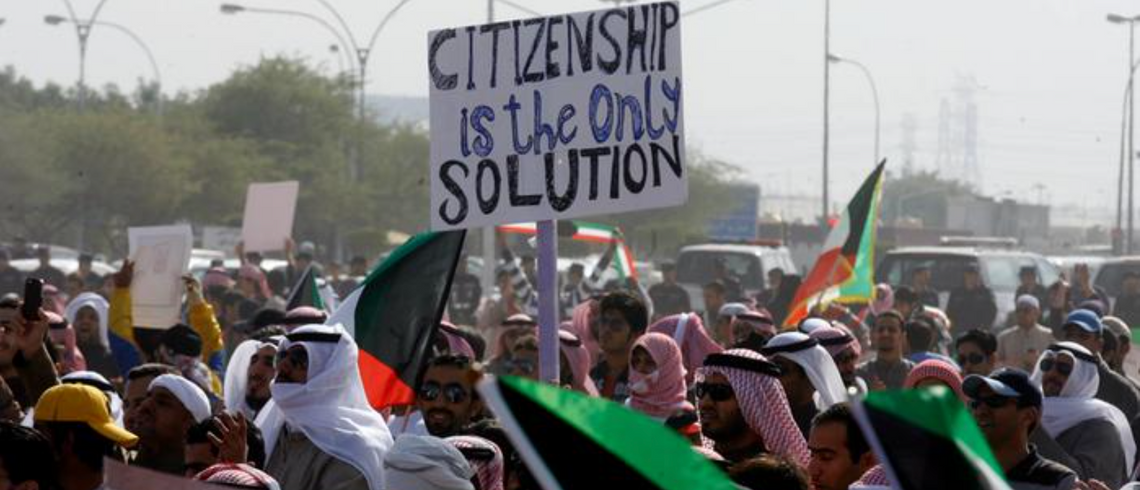Stateless frontline workers in Kuwait’s health sector have complaied that they have not received bonuses, which expatriates and Kuwaiti nationals received, said ImpACT International for Human Rights Policies said yesterday.
The London-based think tank condemned the malpractice calling it “nationality-based violation and discrimination” especially as Kuwait is facing the Coronavirus pandemic and the burden of tackling it lies on the shoulders of all health workers, including the stateless.
In a video on Twitter, Kuwaiti Ministry of Health employee Ahmed AlAnzi said he has not received his salary for the year since September 27, 2020, as well as not receiving any bonuses.
He stated that he has waited 12 months to receive his monthly salary of 200 Kuwaiti dinars per month that he needs to support his family and pay his rent. AlAnzi also said he had suffered a COVID-19 infection twice and had infected family members.
Kuwait’s health sector
Early last August, a stateless employee set himself on fire in front of the Al-Sabah Governmental Hospital in protest at the conditions of employment he was suffering.
Many stateless employees complained about being denied the financial bonuses for their work in the pandemic, even though the bonuses were allocated to frontline workers and those affiliated with government bodies.
ImpACT siad that the bonuses are disbursed from an additional appropriation of 600 million Kuwaiti dinars, set with the approval of the Budgets and Financial Account Committee of the Cabinet in May 2021, where it set the mechanism(s) for obtaining the bonuses in its resolution No. 686 of 2020.
However, as the disbursement of bonuses began following the approval by the Civil Service Commission, it became apparent that they were only to be offered to government employees and not to contractors, which applies to the stateless employees as they do not have ID cards or other identification, ImpACT said.
The Ministry of Health confirmed this saying that the stateless are not subject to the Civil Service Commission Law. The Ministry confirmed that 1,056 stateless workers are frontline workers, including doctors, pharmacists, nurses and technicians.
Cabinet Resolution No. 686 specified the entitlement to bonuses for employees in the government sector only, and does not include contract workers of any nationality, the Ministry added.
The Kuwaiti Government Communication Center later clarified that the bonuses would be paid to ‘all employees of government agencies who meet the conditions, regardless of the employee’s nationality, whether Kuwaiti, non-Kuwaiti or illegal residents.”
Stateless persons in Kuwait
The stateless, who number about 100,000 people and are seeking Kuwaiti citizenship, are still stuck in a legal impasse that goes back to the founding of the Kuwaiti state in 1961, ImpACT said.
The Kuwaiti authorities issue “security cards” to stateless persons, but these cards are not considered official personal IDs, when the authorities have classified them as illegal residents.
ImpACT said noted tht this group is deprived of several basic rights in Kuwait, including health services and work, as being stateless people they will often attempt to bend the law to obtain these rights.
There is an urgent need to develop immediate solutions to this problem of non-disbursement of salaries and bonuses to health sector workers in Kuwait, regardless of their nationality and legal status, ImpACT said.
It is an urgent need, ImpACT said, stressing the necessity of granting all frontline workers their rights without discrimination.
ImpACT said that the Kuwaiti authorities should fulfill their obligations towards international conventions and agreements, including the International Covenant on Economic, Social and Cultural Rights, Article (7), which states that every person has the right to enjoy just and satisfactory working conditions that guarantee, in particular, a fair wage, safe and healthy working conditions, and a decent living for workers and their families.
Kuwait is obligated under international agreements to protect workers, pay wages regularly, and take measures to extend unemployment benefits to workers who face losing their jobs, or underemployment, especially in times of crisis, ImpACT said.
